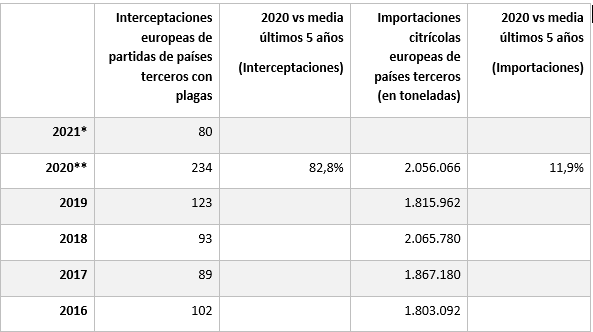- The interprofessional supports the Spanish government’s letter to the European Commissioners, demanding the consideration of Spanish citrus as a ‘sensitive product’ in the next revision of the Southern Africa Agreement and asking for cold treatment for Thaumatotibia leucotreta.
- Since the beginning of the century, 15 pests have become established in Spain, one every year and 4 months, compared to the 9 introduced between 1950 and 1999.
- The number of port rejections generated after detecting quarantine organisms in consignments from third countries has been growing at the same time as the volume of imported citrus fruits.
The Spanish Citrus Interprofessional (Intercitrus) considers that the rate at which foreign pests are entering and establishing themselves in Spanish citrus cultivation – some as destructive as the ‘Cotonet from South Africa’ (Delottococcus aberiae) or now also the threat of Trioza erytreae (already detected in the citrus growing area of the Portuguese Algarve) – is unsustainable. The data support this concern: citrus imports from third countries have been growing steadily, as have European port interceptions due to pests, and this situation has meant that since the beginning of the 21st century, 15 citrus pests from other latitudes have already been introduced into the Iberian Peninsula. Every year and four months, Spanish citrus farming identifies and suffers from a new destructive pathogen, and it does so at a much faster rate than in the second half of the 20th century, when only 9 foreign pests entered. Mites, insects or bacteria that previously passed the phytosanitary controls in the ports. The interprofessional warns that this situation, aggravated by European restrictions on phytosanitary products, should lead the European Commission (EC) to impose cold treatment on imports from third countries in transit.
Intercitrus basically agrees with what was stated in a recent letter from the Minister of Agriculture, Luis Planas and the Minister of Trade, Reyes Maroto, addressed to their European counterparts, Commissioners Janusz Wojciechowski and Stella Kyriakides. In this letter, the Spanish government demands that citrus be considered a ‘sensitive product’ in the next revision of the trade agreement with Southern Africa, as well as applying cold treatment in transit (cold treatment) to imports from countries where the quarantine pest Thaumatotibia leucotreta (FCM, False Codling Moth) has been declared, starting with South Africa.
In this letter, the Spanish government demands that citrus be considered a ‘sensitive product’ in the next revision of the trade agreement with Southern Africa, as well as applying cold treatment in transit (cold treatment) to imports from countries where the quarantine pest Thaumatotibia leucotreta (FCM, False Codling Moth) has been declared, starting with South Africa.
The measure would be nothing extraordinary: it is included in international plant health standards and, in fact, it is the same as that applied by practically all citrus-producing powers to protect their plantations from certain pests such as the one mentioned (such as the USA, China, Japan, Mexico, India, South Korea and Australia). It is also the system, on the other hand, that these same authorities oblige Spanish exporters to comply with in order to guarantee that no viable larvae of the ‘Mediterranean fruit fly’ reaches them. The cold treatment would oblige non-EU operators working with the EU to subject their citrus fruit during transit by ship to Europe to temperatures close to zero degrees Celsius for a certain period of time.La necesidad de aplicar tal tratamiento, además y como también reitera en su carta el Gobierno español, viene avalada por sendos recientes informes de la EFSA (Autoridad Europea de Seguridad Alimentaria). El organismo científico oficial de la UE, analizó la eficacia de los ‘enfoques de sistemas’ (elegidos libremente por Israel y Sudáfrica como alternativa para eludir el cold treatment) de sendos países para mitigar el riesgo de entrada del FCM en los cítricos exportados a la UE. El resultado confirmó que ninguno de los dos cumplía –ni de lejos- con la normativa de la UE, que exige que, sea cual sea la opción elegida, se garantice la ausencia de la plaga.
On September 16, the General Assembly of Intercitrus elected Sanfeliu (from the Private and Related College, represented by the Citrus Management Committee, CGC) as its new president for one year, who took over from Ramón Espinosa (from the College of Production and the ASAJA organization). In his inaugural speech, Sanfeliu made clear what will be the main lines of his mandate: the defense of plant health of citriculture “Spanish and European” and the demand for “reciprocity” to the EU authorities, that is, that oranges and tangerines grown in the EU compete in the European market under the same conditions of production and requirements than those imported from third countries. Intercitrus will denounce –said Sanfeliu- “the worrying loss of competitiveness that Spanish citrus farming is suffering in the European market compared to the supply from third countries”, such as South Africa, Egypt, Turkey and Morocco, among others. The assembly was closed by the Director General of Agrifood Industry of the Ministry of Agriculture, José Miguel Herrero. Sanfeliu took advantage of his presence to ask him for an urgent meeting with Planas. “Now that the government seems to be determined to defend the cold treatment, it would be appropriate to make a common front and also go hand in hand with the Interprofessional to Brussels to claim it,” Sanfeliu has clarified after learning the terms of the letter.
A new analysis conducted by Intercitrus confirms the logical relationship between the number of annual port non-compliances caused by the presence of pests in citrus from third countries and the increase in the volume imported from such sources. As shown in the table below, in 2020, rejections for this reason increased by 82% and the volume imported increased by 11.9%, in both cases with respect to the average accumulated over the last 5 years. The reference year, 2020, was unusual because it was marked, on the one hand, by the ‘Covid effect’ that improved citrus demand and, on the other, by the situation generated by Argentina because of the local rainfall and humidity regime. “Every year it is a different citrus importing country – in 2020 it was Argentina, but before that it was South Africa, Brazil or Uruguay – that is singled out for its phytosanitary problems. On other occasions, it is the authorities of these countries that order the suspension of shipments to Europe when they have almost finished their campaign because they know that their controls are not working and they prefer to get ahead of Brussels being forced to take measures.
Intercitrus recalls in this regard that it is the responsibility of the European Commission (EC) to ensure that the transport of plants and plant products to the EU is free of pests. And the interprofessional is clear on how to prevent their spread. The process should start at the place of production of these plants or fruits, with the registration of production plots and their units, their traceability, treatments, and other agricultural measures. It should be complemented by appropriate inspections in the exporting country during production, intensified sampling procedures and prior communication to the European authorities of the aforementioned list of plots and production units, all supported by an official phytosanitary certificate. In addition, the EC should regularly verify the system with appropriate import audits. Depending on the harmful organism concerned associated with the country of origin of the export, cold treatment should be required, usually in transit. “All these measures would be included in a ‘phytosanitary export protocol’, which is exactly what is being imposed on us in the framework of slow and complex bilateral negotiations between Spain and non-EU countries to be able to export our citrus to ‘non-EU countries’ that are citrus producers,” Sanfeliu clarifies.
Interceptions vs EU imports of citrus fruits from third countries

FUENTES: TRACES / INFORME DE SEGUIMIENTO REFORZADO DE LAS IMPORTACIONES DEL MAPA
* Latest available data. No data available for the same period, January-August, for interceptions and imports..
** Interceptions in 2020 were record-breaking. The anomalous results that year were due to the situation generated by Argentina, with record interceptions due to an unusual rainfall and humidity regime, which facilitated the spread of the Citrus Black Spot fungus without the control programmes being able to prevent up to 112 rejections in Europe due to this pathogen, as well as other fungal problems. So exceptional was the country’s shipping season that the EU suspended imports of Argentine citrus between 26 September 2020 and April 2021. Almost a month earlier, and as on previous occasions, the Argentine SENASA had already agreed with the sector to limit exports by banning lemons.
